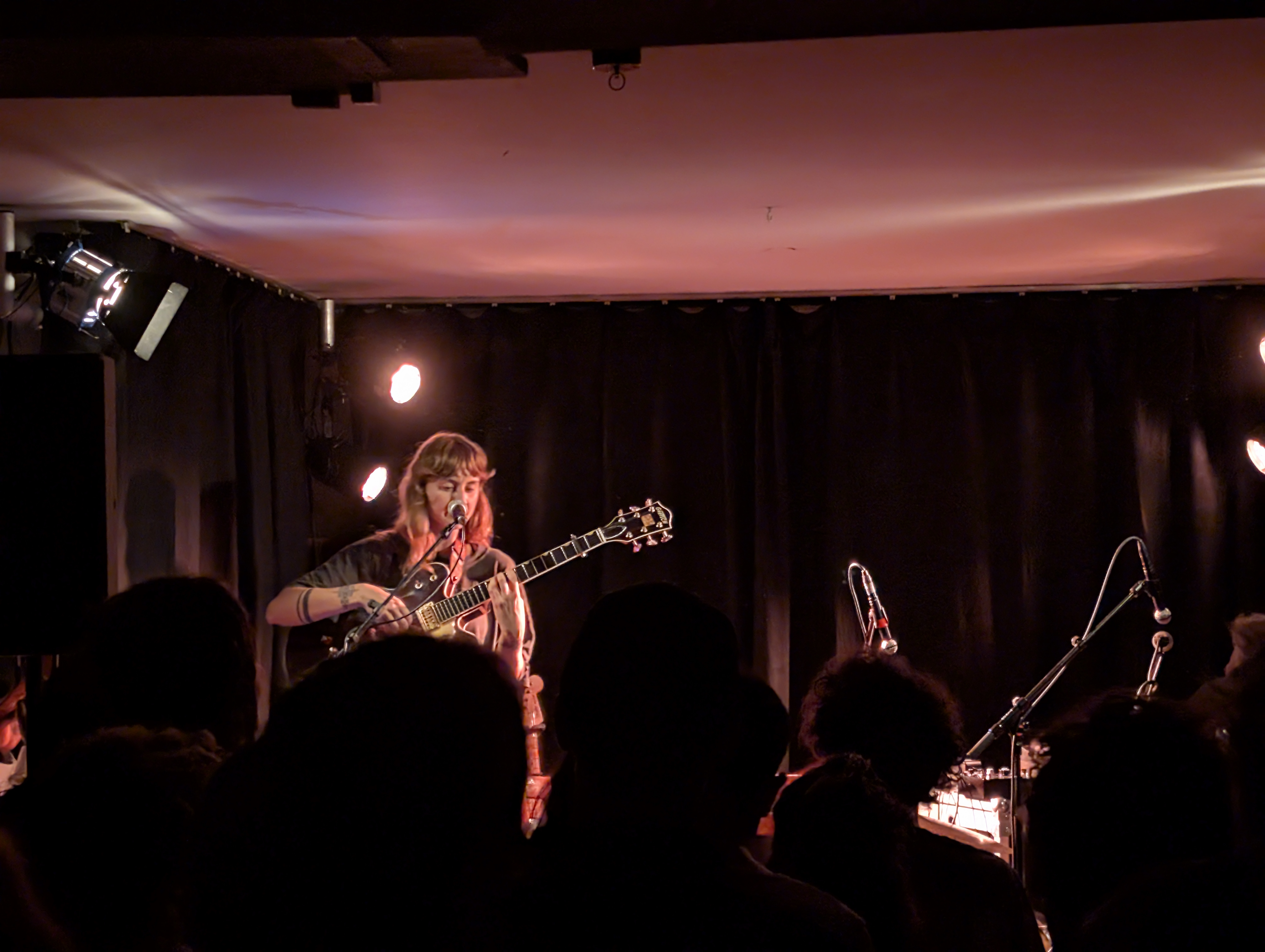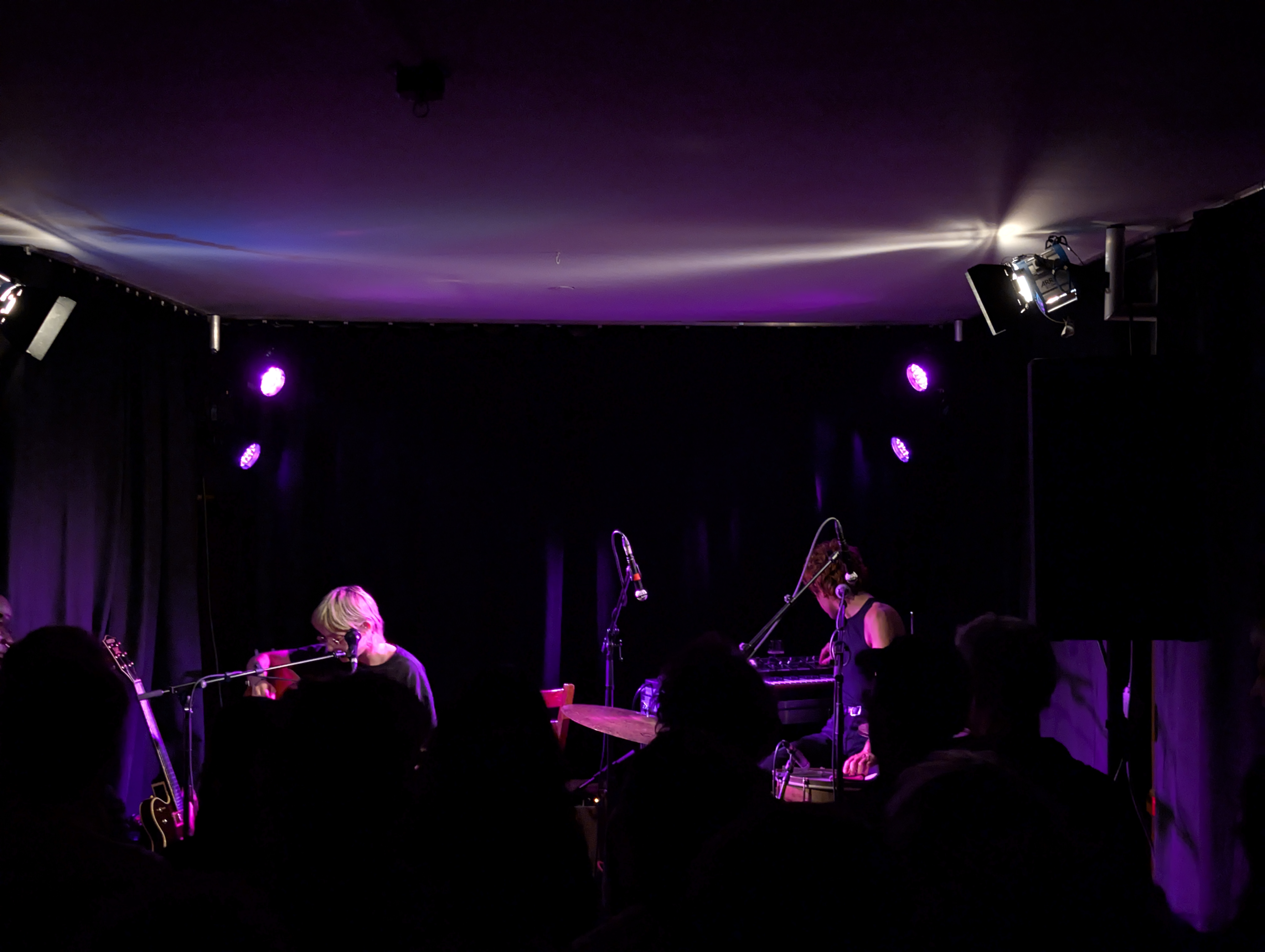Florist in Hamburg
Vorbands sind ja normalerweise eine super Gelegenheit, neue Künstler kennenzulernen, die man bisher nicht auf dem Schirm hatte, die aber ungefähr in die gleiche Kerbe schlagen, wie die Band, die man gerade sehen wollte.

Hannah Frances, die diesmal die Ehre der Einheizerin hatte, fällt insofern ein wenig aus der Reihe, als ich ihr Album „Keeper of the Shepherd“ durch Pitchfork schon ein paar Mal gehört hatte, und auch ziemlich gut fand. Ich hatte keinen Plan, dass sie Vorband war, und war angenehm überrascht davon, dass ich einige Songs schon kannte. Sie hat auf jeden Fall einen perfekten Job gemacht, auf Florist einzustimmen – alleine auf der Gitarre, große Emotionen und kleine Instrumentation, Singer-Songwriter-Mitfühlmusik. Schön fand ich den Moment, als am Ende von ihrem Song „Orange“ die Line „This is our life“ sich langsam in „This is our love“ verwandelte. Etwas sehr idealistisch, aber wunderschön zum Einfühlen. Besser als Florist: Sie ist aufgestanden und hat uns einen Blick auf sich gewährt. Schlechter als Florist: Ich hab’ ihr die Scheu nicht so abgekauft, es wirkte etwas kalkuliert.

Florist waren dann die Hauptattraktion, diesmal im Gegensatz zu ihrem Konzert im Hafenklang nicht als Trio, sondern als zwei Personen. Zur Musik gibt es nach der Beschreibung von Hannah Frances nicht viel hinzuzufügen, außer dass sie es wunderbar hinkriegen, elektronische Sounds und auch Field Recordings in die melancholische Musik einzubauen, was die Immersion in das Gefühl für mich nochmal verstärkt. Das Thema des Nichtsehens der Band wurde durch Emily Sprague aufgenommen, indem sie uns eine visuelle Beschreibung der Band bot, wobei insbesondere die Muskeln von Felix Walworth hervorgehoben wurden. Schade fand ich, dass mein Lieblingssong von »If Blue Could Be Happiness« (»Understanding Light«) nicht vorkam. Was ich hervorragend fand, war die Beschreibung von Emily von dem, was sie am Songwriting schön findet: dass man in den Texten die Tiefen beleuchten kann, die im sonstigen Miteinander so leicht untergehen, und die das Leben doch erst spannend und voller Farben machen. Ich muss sagen, dass das meine Erfahrung nicht trifft, aber diesen Blick darauf so unvermittelt mitzukriegen, ist ein großes Geschenk.
Zwei Momente, die bisher nicht vorgekommen sind: die unglaubliche Hitze im Aalhaus, welches zwecks der Lärmvermeidung im viel zu kleinen Raum voller Leute alle Fenster geschlossen hielt (eine Person ist anscheinend umgekippt), und der Faschismus in Amerika. Hannah Frances meinte, sie sei froh, nicht dort zu sein – Florist, dass ein Raum voller Leute, die eineinhalb Stunden schweigen können und ihre Emotionen mitfühlen, ihr Hoffnung gibt. Ich glaube, solange man kein Südamerikaner (oder Bolton) ist, bekommt man praktisch von der neuen Gestapo namens ICE wohl bis jetzt nicht so viel mit, aber es muss schon für linke Leute sehr beängstigend sein, im Herz des Faschismus unseres Jahrhunderts zu leben.
Opening acts are usually a great opportunity to discover new artists that you hadn’t heard of before but who are similar in style to the band you came to see.

Hannah Frances, who had the honor of warming up the crowd this time, is a bit of an exception in that I had already listened to her album “Keeper of the Shepherd” a few times through Pitchfork and thought it was pretty good. I had no idea she was the opening act and was pleasantly surprised to find that I already knew some songs. She definitely did a perfect job of getting us desiring Florist—alone on the guitar, big emotions and small instrumentation, singer-songwriter music that evokes empathy. I loved the moment at the end of her song “Orange” when the line “This is our life” slowly turned into “This is our love.” A little idealistic, but beautiful to empathize with. Better than Florist: she stood up and gave us a glimpse of herself. Worse than Florist: I didn’t really buy her shyness; it seemed a bit calculated.

Florist, then, was the main attraction, this time not as a trio, unlike their concert at Hafenklang, but as two people. There isn’t much to add about the music over the description I gave for Hannah Frances’, except that they do a wonderful job of incorporating electronic sounds and field recordings into the melancholic music, which further enhances the immersive feeling for me. The theme of not seeing the band was taken up by Emily Sprague, who offered us a visual description of the band, with particular emphasis on Felix Walworth’s muscles. I was disappointed that my favorite song from “If Blue Could Be Happiness” (“Understanding Light”) wasn’t played. What I found excellent was Emily’s description of what she finds beautiful about songwriting: that the lyrics can illuminate the depths that are so easily lost in everyday interactions and which make life exciting and colorful in the first place. I have to say that this doesn’t match my experience, but to get this perspective so immediatly is a great gift.
Two moments that haven’t happened yet: the incredible heat in the Aalhaus, which kept all the windows closed to prevent noise in the much too small room full of people (one person apparently fainted), and fascism in America. Hannah Frances said she was glad not to be there—Florist said that a room full of people who can remain silent for an hour and a half and empathize with her emotions gives her hope. I think that as long as you’re not South American (or Bolton), you probably haven’t noticed much of the new Gestapo called ICE so far, but it must be very frightening for left-wing people to live in the heart of the fascism of our century.